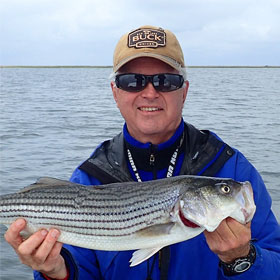In Lieu Of High-Tech Fishing, Try Simple and (Relatively) Low-Tech Fishing
By Ken Schultz
Sep 11, 2024
I once saw a flyer for a fishing tackle collectors’ show that mentioned a brief on-water competition using antique tackle. The idea of doing a bit of fishing with the gear of yesteryear struck my fancy, but only for a few seconds. I wondered if the participants in this event were also going to use rowboats and fish without motors or sonar. Barebones fishing: what a new concept!
Actually, I fish pretty simply a lot, albeit with new-age tackle instead of yesteryear’s knuckle-busting reels and stout metal rods. Much of my freshwater fishing takes place on ponds and small lakes where an ordinary jonboat or kayak and a modest amount of tackle are all that’s needed to enjoy a pleasant and peaceful outing for bass and panfish.
I don’t have anything against large boats, lots of gear, and some high-tech fishing paraphernalia, and own and use these items often for other adventures. But some folks seem to, as I often hear comments about how today’s anglers are spoiled, maybe rely too much on high-tech fishing gadgetry, and perhaps don’t give the fish enough chance.
So, does it make sense to fish simply sometimes, or is this as quaint as writing a term paper on a manual typewriter?
What’s The End Game?
If you’re going to fish simply, whether it’s all or some of the time, it helps to have the right attitude. That means not having an intense gotta-succeed mentality. Be loose. Angling certainly involves catching fish, but it doesn’t have to be a strategic mission to catch the most or the biggest. Contemplate why you’re fishing and what fishing satisfaction means to you.
Be Observant
To make simple fishing more than an exercise in breathing fresh air, however, it helps to remember that people were catching fish long before there were backlash-free or so-called “smart” reels, low-stretch high-tech fishing lines, built-in bite alerts for rods, forward-facing and side-imaging sonar, submersible cameras, and so forth. Sure, the fish are more pressured than ever in some places, but they still have the same pea-sized brains and the same feeding and survival instincts that their ancestors had.
In most places you can’t be completely haphazard about fishing and expect to have more than just hit-or-miss success. So, if you’ve trimmed down your gear you need to take a page from the wading stream angler, who has to know the habits of the quarry and read the water to figure out where to make a presentation. Of course, still waters often don’t belie depth, submerged structure or cover, or bottom contours like flowing waters do. So you’ll have to study the surrounding terrain more closely for clues to underwater features, and, where necessary, use a drop weight to gauge depth when knowing depth is important.
Be Patient and Thorough
Wherever you fish, you should work places quietly, patiently, and thoroughly. Refine presentations and concentrate your efforts, especially anywhere that you catch fish. Many people move away from good spots too quickly, when staying and working a location that has already yielded a fish may yield more with persistent effort. We’re talking fishing efficiency here.
Maximize Movement
When the low-tech angler moves from one place to another, he has an opportunity to do something that 99 out of 100 big-boat anglers don’t contemplate: catch fish and discover open-water hotspots by trolling. I used to fish a municipal water supply reservoir where all motors were prohibited. I rowed. When I wanted to move across the reservoir I always trailed a lure. Many times I caught fish that I would have never seen had I just moved quickly from spot to spot.
You don’t have to reject high-tech fishing equipment, however you characterize that. But when you fish small bodies of water you’ll probably find that you don’t miss sonar, GPS, and other modern microprocessor-equipped accessories, and you don’t need a zillion lures to have a very pleasant day on the water.









